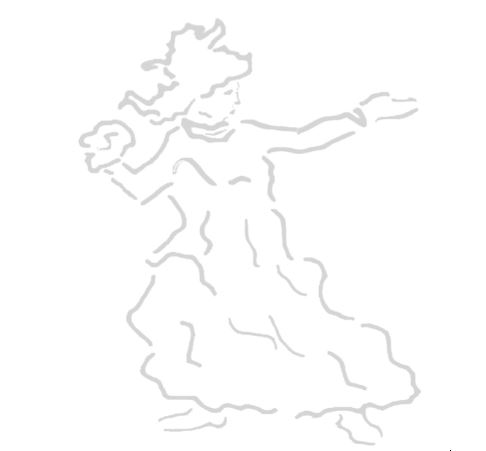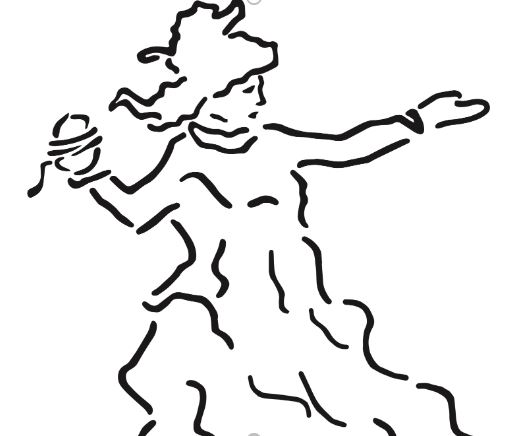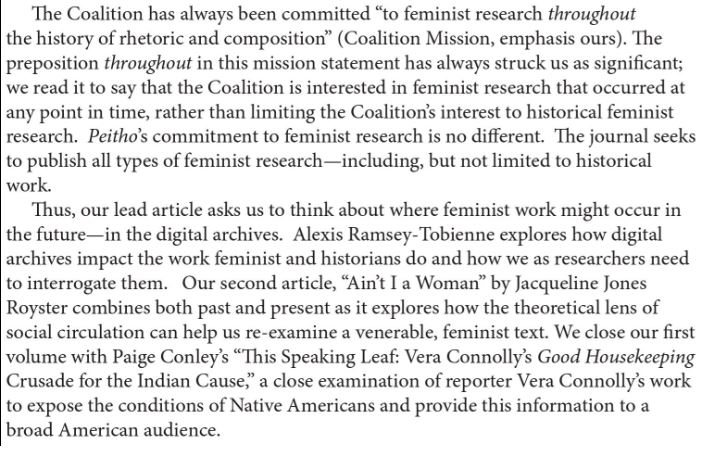The Evolution of Peitho

The Evolution of Peitho
Peitho Volume 24 Issue 4, Summer 2022
Author(s): Barbara E. L’Eplattenier, Lisa S. Mastrangelo
Barbara E. L’Eplattenier is a Professor in the Department of Rhetoric at the University of Arkansas Little Rock. She has a long history with the Coalition, having served as the Secretary, Treasurer, Vice-President, President, Past-President, and Member-at-Large, as well as the Editor of the Peitho Newsletter and the Peitho Journal. She also served as a co-editor of WPA: Writing Program Administration. Her work has focused on the history of women as writing program administrators; her current research focuses on grant writing.
Lisa Mastrangelo is an Associate Professor of English and Director of the Writing Program at Centenary University in Hackettstown, NJ. In addition to being a former President of the Coalition of Feminist Scholars in the History of Rhetoric and Composition, she was a former assistant editor of Peitho. She also served as a co-editor of WPA: Writing Program Administration. She has published on WPA work, the history of writing instruction (particularly at 19th century women’s colleges), and community cookbooks.
Abstract: This retrospective offers a narrative of Peitho’s origin as a newsletter and the long process of turning it into a scholarly journal. We provide institutional history about the Coalition of Feminist Scholars in the History of Rhetoric and Composition and individual people who were heavily involved in producing both the newsletter and the journal. Throughout, we attend closely to realities of academia, including the cachet of peer-reviewed research, and labor issues such as compensation for editorial work.
Tags: Advisory Board, collaboration, editorial board, founding, institutional history, labor issues, PeithoOur collaborations usually begin with Barb saying “How hard can this be?” or some variation thereof. Peitho’s journey from a newsletter to a journal began in just this way. And how hard could it be? we thought. The newsletter already existed, the Coalition was supportive, and the Coalition had been committed since its founding to feminist research throughout the history of composition and rhetoric. If our lives were narrated, the voiceover would have said “It would, in fact, be very hard.” Oh, our naivete.
Peitho: The Newsletter of the Coalition of Women Scholars in the History of Rhetoric and Composition launched its first issue in Fall 1996—three years after the creation of the Coalition—under the stewardship of Kay Halasek and Susan C. Jarratt. The impetus for both the group and the newsletter “was a felt sense of isolation” and a desire to “forge connections across generations and institutions” (Letter from the Editors).
The first letter from the editors opened with

Figure 1: Image from “Letter from the Editors,” Peitho. vol 1, no 1. It reads “Welcome to the first issue of _______. There is a blank at the beginning of our project, just as the histories we’re in the process of creating often begin with blanks where women should be. We begin this newsletter with two kinds of names: one very long and cumbersome and the other, not yet created (see the contest information on page 2), an antithesis that captures the challenge of creating new histories.”
Despite the competition to name the newsletter, Peitho remained Peitho.
Halasek stepped down in 2002 and Susan Romano became co-editor. In 2006, the newsletter went into hiatus for three years. During that time, the Board, led by Lynée Lewis Gaillet, explored converting the newsletter into a print journal. Coalition members were committed, not only to feminist scholarship, but also to greater opportunities for diverse scholars in our field to publish, as well as the mentoring opportunities that such a conversion might provide. The Coalition was also responding to a historical moment. As Patricia Bizzell notes in the “Foreword” to Royster and Kirsch’s Feminist Rhetorical Practices, by 2007 “we all had a sense that feminist research in rhetoric had reached a life-cycle milestone, that its theories and methods were ready to be consolidated and applied more broadly” (ix). We had moved beyond our initial largely essentialist practices, where we attempted to add the history of women onto the histories that we already knew, and had moved towards systematic readings of rhetorical history through a feminist lens. This broader view of feminist rhetorical history required a wider publishing venue.
It soon became evident, however, that a single print issue would require 90 percent of the Coalition’s meager bank account. Without a solid revenue stream (memberships were $5 for grad students and $10 for faculty), the Coalition soon realized that print was an impossible and unattainable dream[1]. An electronic newsletter was the best option at the time: it would be significantly less costly, requiring minimal fiscal outlay by the Coalition because the labor involved would be pro bono; allow the Coalition to reach more people; grant the Coalition time to plan for the peer-reviewed journal, and give the Coalition the capacity to publish a wider modality of texts.
Barb, Coalition President at the time, relaunched Peitho as an electronic newsletter in 2009. Conversion into a peer-reviewed journal also addressed our ethical concerns of asking untenured scholars to publish in a non-peer-reviewed newsletter. In 1996, publication in the newsletter was seen as a positive, but by the time we took over, peer-review publications had become much more heavily weighted in tenure and promotion cases. This meant authors fell into one of two groups: 1) well-established and tenured professors, which perpetuated the perception of an insular community, and 2) grad students early in their careers, where publishing in a newsletter was seen as acceptable way to gain experience, even if it didn’t count for much on the curriculum vitae. When queried by non-tenured authors, Barb’s standard answer was “We’d love to have it, but we aren’t peer-reviewed, and an article with us won’t count as much in your job search or tenure packet.” Although some chose to publish with us, more rightfully did not. Some of those who chose to submit regardless, we redirected towards peer-reviewed publications which would better support their careers. This was often difficult because publication venues for feminist historical work were few at the time—we could, and did, count them on one hand—but we did not feel like we could ethically take away the possibility of a peer-reviewed publication from young scholars. One way we addressed this issue was to begin publishing the Wednesday night talks and notes from the mentoring tables. This allowed us to meet both objectives of the Coalition’s mission.
By 2011, journal planning had begun in earnest. Liz Tasker-Davis, then Coalition President, organized a committee to support the transitions. Membership consisted of herself, Lindal Buchanan (who later became Editorial Board President in 2014), Roxanne Kirkwood (now Kirkwood-Aftanas), Kristi Cole, Patti Hanlon Baker, Whitney Myers, and, in an advisory capacity, Lynée Lewis Gaillet and Barb. The committee wrote The Peitho Development Project report, whose first version proposed that the development of such a journal “be handled internally by coalition members in a phased approach.” It recommended that the journal development move forward in two phases. Phase I includes a mere five steps, none of which dealt with practical items such as actually how to lay out a new journal. Phase II has only four steps, the last of which is “WHAT ELSE?????” (Clearly, we thought that this would be, if not easy, at least not that hard.) WHAT ELSE????? included answers to questions such as how do journals function, behind the scenes? What mechanisms/documents/rules do we need in place? What kind of help do we need, and where can we get it? How can we best keep track of manuscripts, peer reviewer requests, and decisions? Should we compensate editors[2]? What other roles need to be established and filled for Peitho to run smoothly? Should those be compensated as well? What types of scholarly genres should Peitho invite and publish? What will it look like? What format would it take? Where will it be hosted? What does a stable and consistently accessible space for hosting look like? What is the best calendar for Peitho production? Does the layout need to tie into the Coalition website? What kinds of accessibility guidelines will Peitho have[3]? (See Appendix A for the final version distributed to the advisory board in Fall 2011.)
The Committee drew heavily on the Coalition advisory board for the answers to these questions over the years. For example, the first editorial board was the Coalition’s advisory board. Lindal Buchanan, the first President of the Peitho Editorial Board, was a key player in helping to get an ISSN number and developing bylaws. The bylaws were difficult, especially since other journals’ bylaws did not address the unique focus that Peitho had, particularly regarding mentoring, due to the Coalition’s mission. The mentoring program, where mentors were offered to work with authors who submitted manuscripts that were not yet ready for peer review, came from this focus and was possible because of the close relationship with the Coalition advisory board and its mission.
Throughout the process, we met new colleagues as well, many of whom donated their labor and have become lifelong colleagues and friends. When we realized that we needed design help for the layout and technical production of the journal, Lindal sent Cheri Lemieux Spiegel our way. Cheri rescued us from ourselves and took over the InDesign work of the journal. The cover and layouts of the first three issues journal are entirely her design and work. Working with Cheri was a dream. We were completely useless during our first video conference meeting between trying to figure out the technical aspects and our discovery of visual effects in the conferencing platform. Hats! Mustaches! Glasses! Beards! Crowns! Puppy ears! They move with you! (It was 2011. Give us a break). To her credit, Cheri thought “I can work with these people” instead of “get me out of here.” She educated us about layout and multimedia possibilities, offered excellent feedback on editorial decisions, didn’t lose her patience when we kept asking her to “nudge that image just a hair”; created a template to streamline future layout; helped solve last minute technical issues that stymied the launch; and met impossible deadlines. As we wrote in our first Editor’s Note (which we realize now should have been Editors’ Note), “Colleagues such as Cheri remind us of the generosity, intelligence, and cleverness of academics and why we enjoy editing work so much.” It is not an exaggeration to say that Peitho could not have happened without Cheri Lemieux Spiegel.
During our design process, we remained committed to keeping Peitho on the cover. Chosen by the original editors because she was the goddess of persuasion, Peitho was the daughter of Aphrodite, had erotic powers, and was known to represent the polis. The image on the newsletter had originally been derived from a vase at the J. Paul Getty Museum.

Figure 2: Image of a corner of a vase with a black background, with an image of a woman, ochre in color, wearing a flowing Grecian dress and holding a ball of twine in her right hand that she is about to throw.
A small file size with a pixelated image, the image needed reworking for both clarity and technical specs.

Figure 3: light grey stylized image of an outline of the woman from the vase, holding an unidentifiable object in her right hand.
In a meeting, one of us asked “is she throwing a pile of poop?” The cleaned–up image, created by UA Little Rock graphic design professor Kevin Cates, met the technical specs and made it clear that Peitho was holding a ball of twine. We—and when we say we, we mean Cheri—worked hard to ensure that images of Peitho were included either as the cover background, or, as circumstances dictated other covers, in smaller form.

Figure 4: black stylized image of an outline of the woman from the vase, this time clearly holding a ball of twine in her right hand that she is about to throw.
The first issue launched in December 2012. Our Editor’s Note [sic] read, in part,

Figure 5: Image of Editor’s Note. It reads “The Coalition has always been committed ‘to feminist research throughout the history of rhetoric and composition’ (Coalition Mission, emphasis ours). The preposition throughout in this mission statement has always struck us as significant; we read it to say that the Coalition is interested in feminist research that occurred at any point in time, rather than limiting the Coalition’s interest to historical feminist research. Peitho’s commitment to feminist research is no different. The journal seeks to publish all types of feminist research—including, but not limited to historical work.Thus, our lead article asks us to think about where feminist work might occur in the future—in the digital archives. Alexis Ramsey-Tobienne explores how digital archives impact the work feminist and historians do and how we as researchers need to interrogate them. Our second article, ‘Ain’t I a Woman’ by Jacqueline Jones Royster combines both past and present as it explores how the theoretical lens of social circulation can help us re-examine a venerable, feminist text. We close our first volume with Paige Conley’s ‘This Speaking Leaf: Vera Connolly’s Good Housekeeping Crusade for the Indian Cause,’ a close examination of reporter Vera Connolly’s work to expose the conditions of Native Americans and provide this information to a broad American audience.”
The first issue was more sweat, tears, and digital wrangling than we could have imagined (How hard can it be? Very hard.). But the journal was official! And we were ready for it to become someone else’s labor of love. Our original plan had always been to be transitional editors and, after the Spring/Summer 2013 issue, we wrote a handoff email, and the journal’s editorship officially transitioned to Patricia Sullivan and Jennifer Bay at Purdue University on June 27, 2013. It was an auspicious moment for us, and we knew that without the support of the Coalition and the generosity of volunteer labor, none of this would have happened.
Since then, the journal has grown in leaps and bounds. It has changed directions in order to keep up with the changing directions of our field; it has changed platforms able to handle multimodal pieces; and it has changed editorships multiple times and expanded its readership.
We are proud of the work that we did in those early years to see Peitho come into existence. We look forward to following Peitho and how it will change, and move, and grow over the next ten years.
End Notes
[1]Other concerns, Nancy Myers reminded thePeitho committee two years later in an email, included the organizational and institutional structures between the Coalition and the journal; a clearly defined statement of the vision/mission and direction of the journal; and a timetable.
[2]It is worth noting that, at the time, the compensation offered in the Fall 2012 Editor RFP was the highest compensation of any of the RW journals that we knew of: “The Coalition will pay for the editor to take a training workshop on InDesign (the publishing program), and the editor may also hire a student intern for 15-20 hours per issue at a total cost of $500 per year. The editor will also receive a stipend of $200 after the successful completion of each issue. Finally, the Coalition will pay the editor’s registration fee for the Feminisms and Rhetorics biennial conference” (Peitho Call for Editors).
[3]Jenn Fishman, who had been elected to the board as Secretary that year, was particularly helpful in answering the what else question. Many of the questions listed here are hers.
Appendix A
Peitho Development Proposal, Version 3 (revised October 16, 2011)
The ad-hoc committee advises that CWSHRC proceed with the development of Peitho into a biannual peer-reviewed journal and that the project be handled internally by coalition members in a phased approach. The first phase involves transforming Peitho from a newsletter to a peer-reviewed online journal. While the likely goal of the second phase would be to create a printed form of the journal, the committee believes that plans beyond Phase 1 should be deferred until the Phase 1 plan is enacted.
This revised proposal addresses the feedback we received on our initial proposal, which was distributed in May of 2011.
Policies
Peitho, the peer-reviewed journal of the Coalition of the Women Scholars in the History of Rhetoric and Composition, exists to support the Coalition’s mission as “a learned society composed of women scholars who are committed to research in the history of rhetoric and composition.” The journal, like the Coalition, will “promote and foster collaboration and communication” among women in these areas of specialization. Peitho seeks to encourage, advance, and publish research in the history of rhetoric and composition and thereby support scholars and students within our profession.
Organizational Structures
Three organizational structures participate in Peitho’s production: a publication committee, an editor and associate editor, and editorial board.
Publication Committee:
The journal will be overseen by a publication committee, which shall
- be composed of the editor and associate editor of Peitho, who serve as ex officio (nonvoting) members; an Executive Board member; two Advisory Board members; and three general membership members. Voting members shall not exceed six.
- coordinate all publications that bear the name of the Coalition of Women Scholars in the History of Rhetoric and Composition.
- coordinate the call for editors, review applications, and recommend editors to the Board, which will have the final vote.
- review performance of the journal’s editor during his/her four-year appointment.
- recommend a course of action to the Board in the case of gross negligence by the journal editor.
Editor and Associate Editor:
Editorships will run on a four year, overlapping cycle. Each editor will spend the first two years in an associate editorship position, learning the position’s responsibilities and duties. The last two years will be spent as the editor, being responsible for mentoring and training the incoming editor. However, an editor may serve more than one term if conditions warrant.
Staffing is at the editor’s discretion (with the exception of the associate editorship).
The editor is a representative of the Coalition and is expected to function in such a manner.
The editor has full purview over the editorial content and production process of the journal. She will also retain responsibility for publishing the journal—i.e., establishing an editorial board (which must be approved by the Board), issuing calls for papers, clarifying the journal’s submission process, etc.
However, she is not responsible for hosting the journal or for redesigning it.
The editor and associate editor positions are noncompensatory. However, as a courtesy, both are extended free registration at the Feminisms and Rhetorics conference during their terms.
The ad-hoc committee believes that having experienced officers in the editor and associate editor positions is critical to ensuring Peitho’s smooth and timely transition from a newsletter to a peer-reviewed journal. It, therefore, nominates Barbara L’Eplattenier as journal editor and Lisa Mastrangelo as associate editor.
Editorial Board:
The ad-hoc committee recommends that the Coalition of Women Scholars’ current advisory board serve as its initial editorial board. An alternate board will put in place by Peitho’s editor and associate editor by fall 2013.
Publication of Peitho shall be overseen by the Coalition’s Publication Committee; editorial responsibilities shall remain the purview of the current editorial team.
Timeline
The first issue of the first issue of Peitho will appear online in fall 2012.
Budget
Putting Peitho online will incur both initial start-up costs and ongoing expenses.
Start-up costs:
These consist of purchasing a publishing program, providing software training for the two initial co-editors, and setting up restricted access so that only members can view Peitho.
Publishing Program: InDesign Creative Suite $449 (standard) or $599 (premium)
(for educators, version 5.5 standard; premium adds Adobe Flash and DreamWeaver)
Training for 2 co-editors $1400 (2-day class for two attendees; does not include travel)
Membership software Cost to be determined (only essential if we want to restrict journal access to members)
On-going costs:
These include software training for new co-editors, co-editors’ registration fees for the Feminism and Rhetorics conference, and hourly wages for an intern.
Intern (15-20 hours per issue) $500 per year
Co-editors’ compensation (2 registration fees) $600 every two years
New co-editors training on publishing software $700 every two years
NOTES:
- At some point, if our organization grows, we recommend considering a stipend for the co-editors.
- Peitho’s launching will not require additional resources beyond the CWSHRC’s current server space, email accounts, or subdomains. It is using minimal server space currently. Disk Space Usage256.83 MB / 5000, MBBandwidth (this month)18.52 MB / 100000, MBEmail Accounts1, Unlimited Subdomains1 / Unlimited
- CWSHRC is now located on a commercial server. The Peitho ad-hoc committee recommends keeping Peitho on a commercial server to prevent changes in domain name and to ensure that the Coalition owns the journal copyrights.
Journal Structure/Form
The committee recommends that CWSHRC invite Peitho design and layout ideas/proposals from selected university programs/departments/instructors. We are currently working on the development of this service-learning project.
Works Cited
Ad Hoc Committee. “The Peitho Development Report Draft,” 20 May 2011.
Bizzell, Patricia. Foreword. Feminist Rhetorical Practices: New Horizons for Rhetoric, Composition, and Literacy Studies, by Jacqueline Jones Royster and Gesa E. Kirsch, Southern Illinois UP, 2012, pp ix–xii.
Fishman, Jenn. “Re: Peitho Committee Proposal.” Received by Nancy Meyers, Lindal Buchanan, Barb L’Eplattnier, Patti Hanlon-Baker, Roxanne Kirkwood, Kirsti Cole, Elizabeth Tasker, Lynée Lewis Gaillet, and Lisa Mastrangelo, 12 July 2011.
Halasek, Kay and Susan C. Jarrett. “Letter from the Editors.” Newsletter of the Coalition of Women Scholars in the History of Rhetoric and Composition, vol 1, no. 1 Autumn/Winter 1996. /peitho-the-newsletter/#1996–200.
L’Eplattenier, Barb. “Peitho Call for Editors.” General electronic distribution, 21 August 2012.
L’Eplattenier, Barbara E. and Lisa Mastrangelo. “Editor’s Notes.” Peitho, vol. 15, no. 1, Fall/Winter 2012, /docs/peitho/v15n1/.
Myers, Nancy “Peitho Committee Proposal.” Received by Jenn Fishmann, Lindal Buchanan, Barb L’Eplattenier, Patti Hanlon-Baker, Roxanne Kirkwood, Kirsti Cole, Elizabeth Tasker, Lynée Lewis Gaillet, and Lisa Mastrangelo, 26 July 2011.